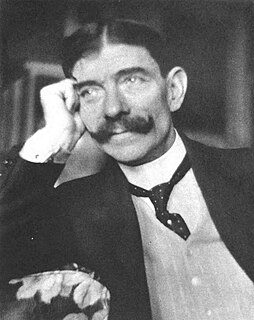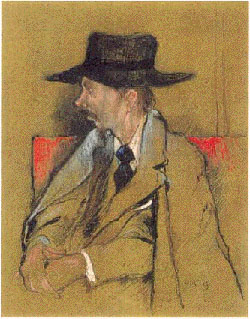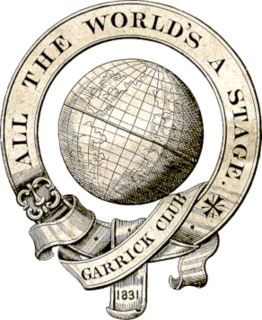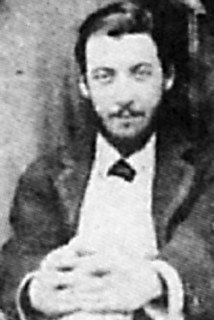
Oscar Fingal O'Flahertie Wills Wilde was an Irish poet and playwright. After writing in different forms throughout the 1880s, he became one of the most popular playwrights in London in the early 1890s. He is best remembered for his epigrams and plays, his novel The Picture of Dorian Gray, and the circumstances of his criminal conviction for gross indecency for consensual homosexual acts in "one of the first celebrity trials", imprisonment, and early death from meningitis at age 46.

The Importance of Being Earnest, A Trivial Comedy for Serious People is a play by Oscar Wilde. First performed on 14 February 1895 at the St James's Theatre in London, it is a farcical comedy in which the protagonists maintain fictitious personae to escape burdensome social obligations. Working within the social conventions of late Victorian London, the play's major themes are the triviality with which it treats institutions as serious as marriage, and the resulting satire of Victorian ways. Some contemporary reviews praised the play's humour and the culmination of Wilde's artistic career, while others were cautious about its lack of social messages. Its high farce and witty dialogue have helped make The Importance of Being Earnest Wilde's most enduringly popular play.

The Picture of Dorian Gray is a philosophical novel by Oscar Wilde. A shorter novella-length version was published in the July 1890 issue of the American periodical Lippincott's Monthly Magazine. The novel-length version was published in April 1891.

Frank Harris was an Irish-American editor, novelist, short story writer, journalist and publisher, who was friendly with many well-known figures of his day.

Sir Rupert Charles Hart-Davis was an English publisher and editor. He founded the publishing company Rupert Hart-Davis Ltd. As a biographer, he is remembered for his Hugh Walpole (1952), as an editor, for his Collected Letters of Oscar Wilde (1962), and, as both editor and part-author, for the Lyttelton/Hart-Davis Letters.

Sir Henry Maximilian Beerbohm was an English essayist, parodist and caricaturist under the signature Max. He first became known in the 1890s as a dandy and a humourist. He was the drama critic for the Saturday Review from 1898 until 1910, when he relocated to Rapallo, Italy. In his later years he was popular for his occasional radio broadcasts. Among his best-known works is his only novel, Zuleika Dobson, published in 1911. His caricatures, drawn usually in pen or pencil with muted watercolour tinting, are in many public collections.

Aubrey Vincent Beardsley was an English illustrator and author. His black ink drawings were influenced by Japanese woodcuts, and depicted the grotesque, the decadent, and the erotic. He was a leading figure in the aesthetic movement which also included Oscar Wilde and James McNeill Whistler. Beardsley's contribution to the development of the Art Nouveau and poster styles was significant despite his early death from tuberculosis. He is one of the important Modern Style figures.

The Yellow Book was a British quarterly literary periodical that was published in London from 1894 to 1897. It was published at The Bodley Head Publishing House by Elkin Mathews and John Lane, and later by John Lane alone, and edited by the American Henry Harland. The periodical was priced at 5 shillings and lent its name to the "Yellow Nineties", referring to the decade of its operation.

George Meredith was an English novelist and poet of the Victorian era. At first his focus was poetry, influenced by John Keats among others, but he gradually established a reputation as a novelist. The Ordeal of Richard Feverel (1859) briefly scandalized Victorian literary circles. Of his later novels, the most enduring is The Egoist (1879), though in his lifetime his greatest success was Diana of the Crossways (1885). His novels were innovative in their attention to characters' psychology, and also took a close interest in social change. His style, in both poetry and prose, was noted for its syntactic complexity; Oscar Wilde likened it to "chaos illumined by brilliant flashes of lightning". He was an encourager of other novelists, as well as an influence on them; among those to benefit were Robert Louis Stevenson and George Gissing. He was nominated for the Nobel Prize in Literature seven times.

"Enoch Soames" is the title of a short story by the British writer Max Beerbohm. Enoch Soames is also the name of the main character.

Ada Esther Leverson was a British writer who is known for her friendship with Oscar Wilde and for her work as a witty novelist of the fin-de-siècle.

The Garrick Club is a gentlemen's club in the heart of London founded in 1831. It is one of the oldest members' clubs in the world and since its inception has catered to members such as Charles Kean, Henry Irving, Herbert Beerbohm Tree, Arthur Sullivan, Laurence Olivier, Raymond Raikes, Stephen Fry and John Gielgud. From the literary world came writers such as Charles Dickens, H. G. Wells, J. M. Barrie, A. A. Milne, and Kingsley Amis. The visual arts have been represented by painters such as John Everett Millais, Lord Leighton and Dante Gabriel Rossetti.
George Slythe Street was a British critic, journalist and novelist. He was born in Wimbledon, London on 18 July 1867. He was associated with William Ernest Henley and the 'counter-Decadents' on the staff of the National Observer. His works were characterized by "whimsy, detachment, sympathy, tenderness, satire, humor, and occasionally cynicism". Street's satirical works assailed "snobbery, hypocrisy, vulgarity, and pretentiousness at all levels of society, especially among the aesthetes and the upper class". He is perhaps best known for his 1894 novel, the Autobiography of a Boy, which satirized contemporary aesthetes Oscar Wilde and Lord Alfred Douglas, although Street would later write favorably of Wilde's De Profundis.

William Charles Kingsbury Wilde was an Irish journalist and poet of the Victorian era and the older brother of Oscar Wilde.

This is a bibliography of works by Oscar Wilde, a late-Victorian Irish writer. Chiefly remembered today as a playwright, especially for The Importance of Being Earnest, and as the author of The Picture of Dorian Gray; Wilde's oeuvre includes criticism, poetry, children's fiction, and a large selection of reviews, lectures and journalism. His private correspondence has also been published.

De Profundis is a letter written by Oscar Wilde during his imprisonment in Reading Gaol, to "Bosie".
The Works of Max Beerbohm was the first book published by English caricaturist, essayist and parodist Max Beerbohm. It was published in 1896 when Beerbohm was aged 24.

Seven Men is a collection of five short stories written by English caricaturist, essayist and parodist Max Beerbohm. It was published in Britain in 1919 by Heinemann. In the United States there was a 1920 limited edition from Alfred A. Knopf with drawings of the characters by Beerbohm, followed by a popular edition in 1921. An enlarged edition, Seven Men, and Two Others, containing the new story "Felix Argallo and Walter Ledgett" interpolated as the last but one item, was published by Heinemann in 1950.

Reginald "Reggie" Turner was an English author, an aesthete and a member of the circle of Oscar Wilde. He worked as a journalist, wrote twelve novels, and his correspondence has been published, but he is best known as one of the few friends who remained loyal to Wilde when he was imprisoned and who supported him after his release.

A Defence of Cosmetics is an essay by caricaturist and parodist Max Beerbohm and published in the first edition of The Yellow Book in April 1894. Aged 21 when the essay was published, it established his reputation. It later appeared in his first book, The Works of Max Beerbohm (1896) as The Pervasion of Rouge.
















